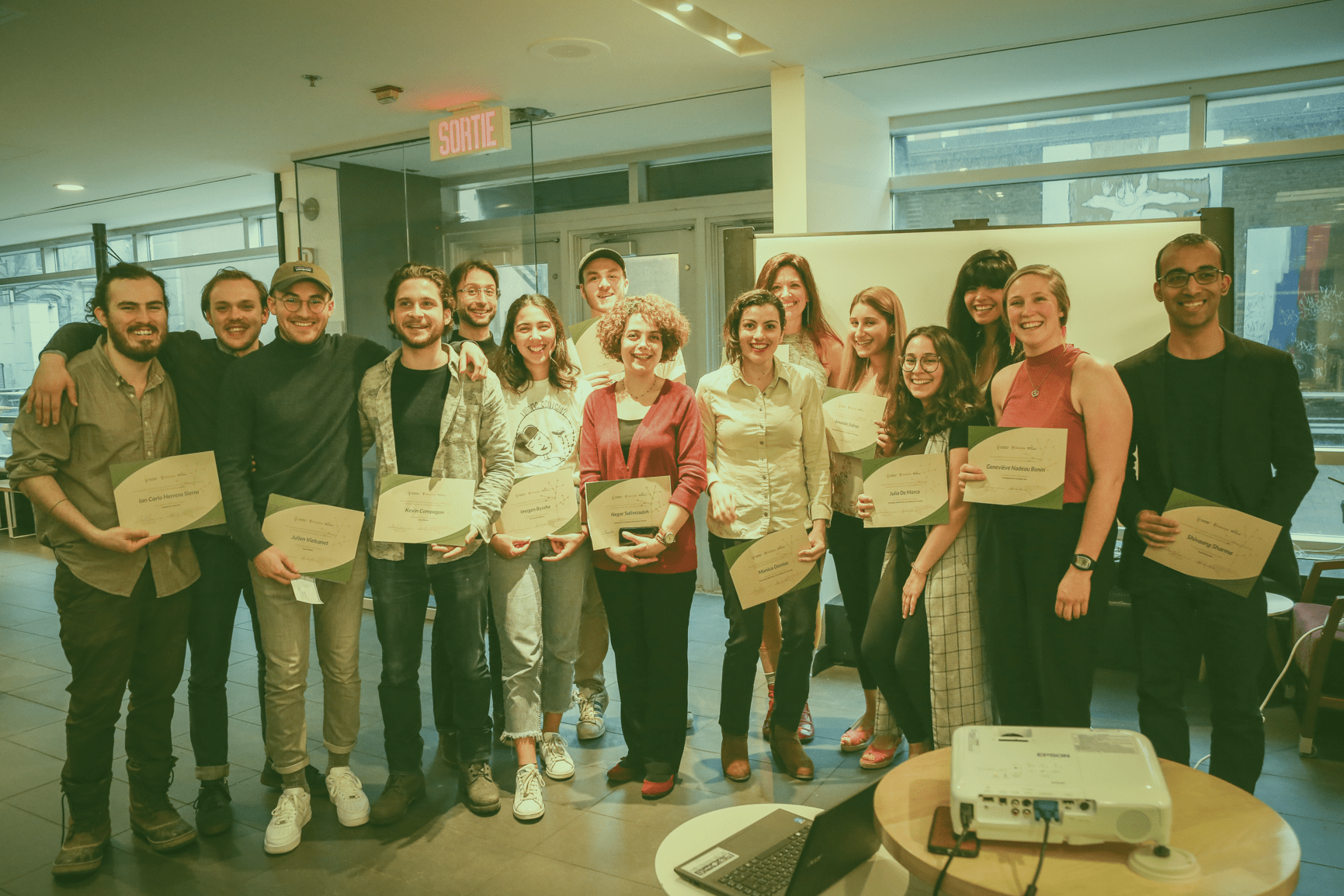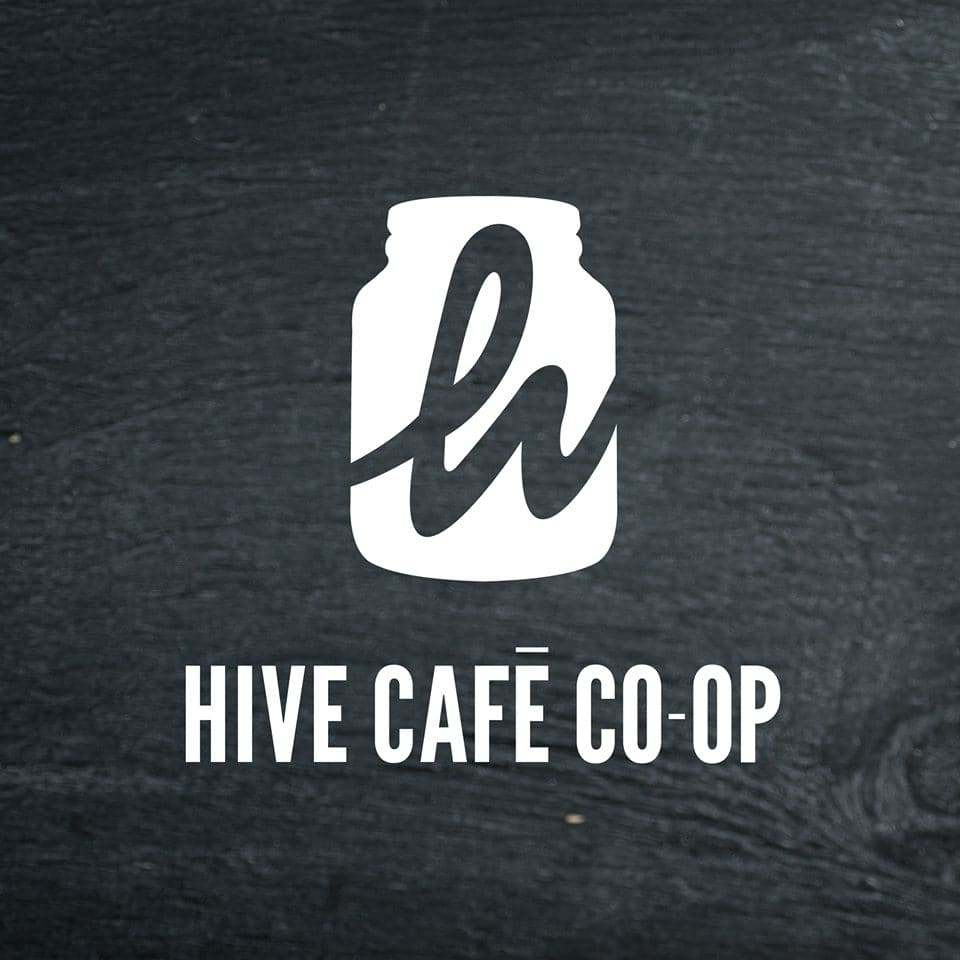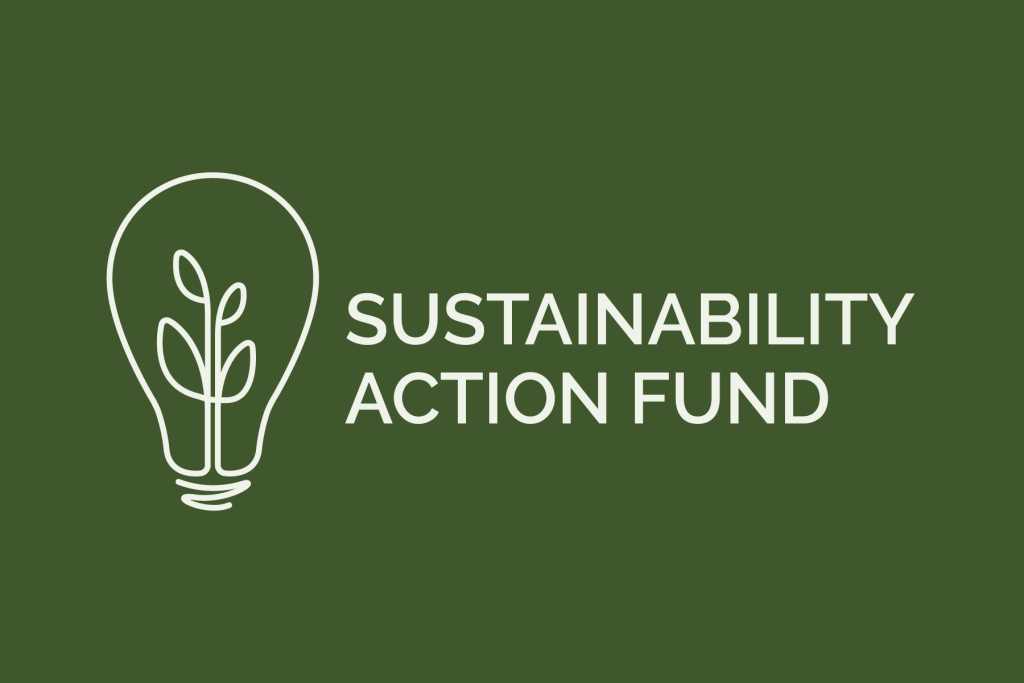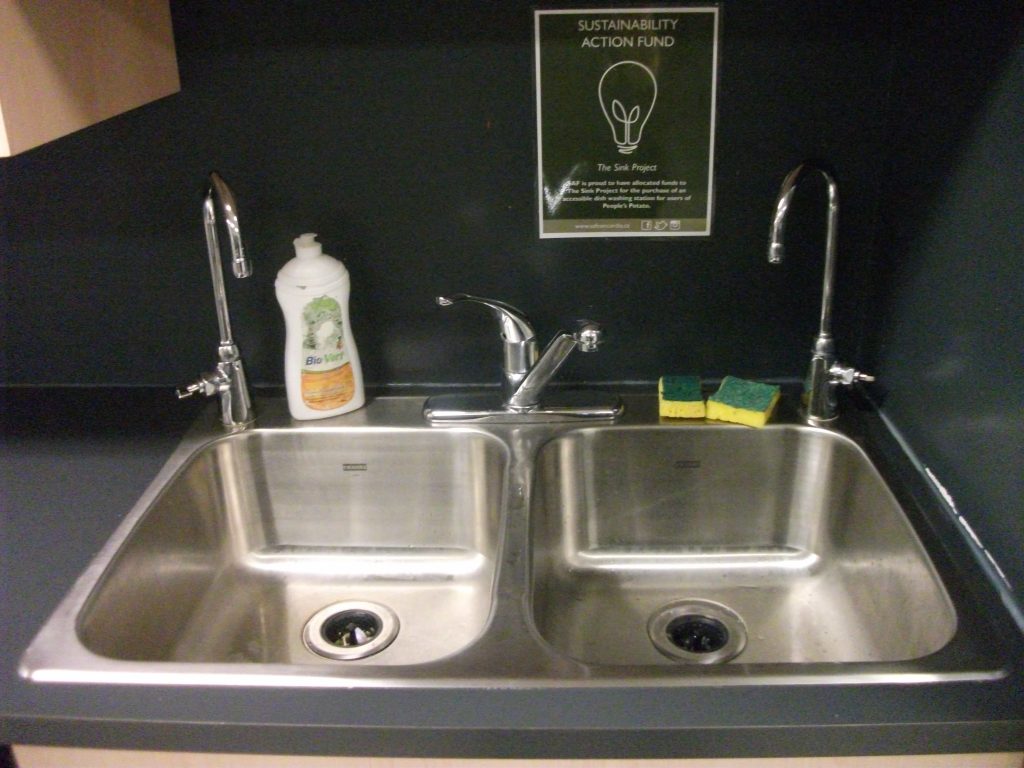2022-2023
Sustainability Research Award Recipients
2021-2022
Sustainability Research Award Recipients
2020-2021
Sustainability Research Award Recipients
2019-2020 Sustainability Research Award Recipients
2018-2019
Sustainability Research Award Recipients
2017-2018
Sustainability Research Award Recipients
Ecology & New Media
Sofia Munera, Rebecca Rogers & Natalia Ramirez
Our research project aims to better understand the environmental issues faced by wetlands situated within, or close to an urban environment.
Precisely, we are focusing our research on the Mont-Royal Swamp, a fairly unknown wetland located at the heart of Montreal that sustains many forms of life and biodiversity. In our research we wanted to explore how wetlands located close to urban environments present peculiar environmental challenges but also how our representation of nature impacts the actions taken by individuals or communities towards the natural environment.
Nova Plastics
Julien Vielcanet, Nicholas Staub, Kevin Compagon & Victor Simoncello
Recipient of the Eric St-Pierre Award
The goal of our project is to educate people to consume in a better way. We want to tackle is the management of plastic waste and behaviour of people regarding this. The idea would be to create a workspace in the campus where people would bring their plastic waste. In that workspace we would collect, sort, recycle and create new object out of plastic waste. We want to join the Precious Plastic community and create a dynamic recycling environment at Concordia. Precious Plastic is a community of individuals committed to find new solutions to plastic pollution. All of their inventions, machines and knowledge are available in open source. Our project would be to learn from their expertise, create our workspace and implement a market of recycling-goods in the university.
Vermicycle
Ian Carlo Herrera Sierra
Recipient of the Eric St-Pierre Award
The goal of this project is to promote solidarity in-between students and working groups affiliated or interested to food growth, food processing, and in general-the food cycle. To improve Concordia’s food waste management by bringing together the waste from The People’s Potato/The Hive as compost along with bringing leftover newspaper carbon sources from The Concordian as our nutrient source for our hard working wormy system drivers.
We will engage interested volunteers in creating a high value vermi-compost that will be used in food production at Concordia’s facilities (City Farm School, Campus Potager, Concordia Greenhouse, etc.) with the idea of having a closed loop food-system that will fortify Concordia’s sustainability goals. We intend to offer social-service hours for credits with professors should they be willing along with self interested volunteers.
Knowledge Mobilization and Collaborative Learning in the Context of the Sustainability and Food Movements
Monica Dantas, Julia De Marco, Alexa Carota, Amanda Sidiras & Sherif Goubran
Over the last years, there has been an increase in the number of grassroots projects and agencies aiming to mobilize knowledge and awareness on food sustainability issues. Many entities claim that their activities result in community building, resilience, as well as the reduction of the knowledge-to-action gap. Collaborative learning activities can include presentations, open discussions, debates, case studies, reflective practices and hands-on workshops. Nevertheless, there has been limited research on collaborative learning in the context of the sustainability and food movements. Since education has its impact when “learners” can transfer their knowledge to new problems, this research aims to review and categorize different collaborative learning approaches in the context of the sustainability and food movements. Considering the complexity these social movements, the paper will draw on literature from the fields of Education, Community Development, Sociology, Anthropology, and Design. The research includes a study case on Season Jars preservation project, which unlike other community kitchens, cover a variety of topics besides food preparation, including history and cultural heritage, the health benefits of preservation, the biochemistry of food preservation as well as the socio-economic, environmental and food security implications of preserving local, seasonal food.
The Entomo Collective
Imogen Bysshe & Jackson Lewis
Entomophagy is the word for humans eating insects. The Entomo Collective is looking to build a culture of sustainability in the Concordia community through an exciting and quickly growing food movement that revolves around edible insects. By producing our own insects and selling them at the Concordia Farmers Market, we will develop an environmentally conscious and affordable protein to share with the Concordia community. Food sovereignty, the notion of being in control of your own food, including– knowing where your food comes from, who made and distributed it, and the methods involved in its creation– is an overarching goal for this project. By making food available to students that we can guarantee was made sustainably by other students and is affordable, we will be able improve food sovereignty and availability on campus. Additionally, we plan on teaching students and others how to farm their own mealworms at home, bringing them even closer to having control over their diet that will ultimately leave a smaller impact on this planet. Insects have been eaten for thousands of years in several countries but has never been successful in contemporary North America. We believe it’s time this sustainable protein reaches Concordia!
Growing Food on Unknown Soil
Geneviève Nadeau Bonin
This research project is being conducted in Kahnawake, but this is not to say that this project has no benefits to the Concordia community. Students from different faculties (Arts & Science and Engineering) were able to get hands- on experience in the field, something that is not usually offered to students. In April, there will be a presentation, for students and faculty, to share the results from this project, and to reflect on how Concordia students may offer their knowledge and skills as allies in indigenous sovereignty projects. I believe it is important that we recognize that at Concordia, we are on unseeded territories belonging to the Kanien’kehá:ka Nation. They have been displaced, moved around and confined to the small reserve that is now called Kahnawake. I believe that within the framework of reconciliation, organizations such as SAF and institutions such as Concordia should work towards creating and strengthening relationships with indigenous communities. This project is working towards empowering Mohawks from Kahnawake to create a more sustainable lifestyle by helping to understand soil contamination in their garden. Access to safe and healthy locally sourced food is a base for combatting health,social and economic inequalities that stem from Canada’s systematic colonial racism.
Social Innovation
Shivaang Sharma
Student entrepreneurs are tackling complex social challenges in and around university campuses in the domains of sustainability education, social exclusion and poverty. These enterprising students achieve this through social innovations (SI) – new solutions to social problems that are more effective and sustainable than existing market solutions. Through the vehicle of a social enterprise, which puts social purpose above financial growth, entrepreneurs can develop and implement SIs that benefit their communities. However, due to the focus on social purpose, student entrepreneurs face unique challenges. This applied research seeks to understand these challenges by focusing on two research questions (i) how the student entrepreneurs embed a social mission into their enterprise and (ii) how do they overcome the internal tensions between scaling for social impact and ensuring financial sustainability of their enterprise. The student founders of 10 to 15 social enterprises will be interviewed to shed light on the research questions. This research is expected to have several academic and practical contributions. Academically, it enhances the interdisciplinary study of SI as a phenomenon by delving into SI literature in sociology, community psychology, development studies and management. The key practical outcome is to develop solutions for the challenges faced by participating students.
Optimization of Building Photovoltaic Potential
Negar Salimzadeh
Recipient of the Eric St-Pierre Award
The world’s population who lives in cities is expected to become 66% by 2050 and this means a huge energy demand! The exacerbating global warming issues and the depleting fossil energy resources are making the need for sustainable energy resources. Photovoltaic energy is one of the most promising sources of clean energy. Since the recent urban developments are mostly happening vertically, there is a considerable potential, especially on the high-rise building facades in addition to the rooftops, for generating PV energy in urban areas. This necessitates a thorough analysis of the outer surfaces of the building in terms of potential solar radiation, especially in large cities where the urban canyon phenomenon exists. However, the existing methods do not discriminate between different types of surfaces of the building and treat the entire envelope as a single surface. Given the fact that the selection of appropriate PV panel depends on the type, material, geometry, and location of these surfaces, this research aims at developing a comprehensive and over-arching PV panel layout planning and optimization that consider various types of panels simultaneously for Concordia campus buildings to maximize the PV energy generation and minimize the total cost.
Ethical Textile Design
Karolyn Martin
My project is influenced by this observation: we (Western society) are an over-consuming society, and it has huge negative impacts on Earth and its human and non-human inhabitants. All the objects, appliances, vehicles, clothes, in summary, everything we buy has something in common: the designer(s) behind it. I am a designer. I create furniture and accessories, using reclaimed wood and textiles. My research/project is about design, textiles, sustainability, and ethics. It is also about learning and sharing, and it is supported by three components: a book of fabrics; interviews with Montreal textile designers and professors from academies which offer programs in connection with textile; and a workshop series with Concordia students. My goal is to connect with the ethical textile community of Montreal and its different stakeholders. I strive to improve my expertise for sustainable materials while sharing my knowledge with the Concordia community.
Towards a Participative Sustainable University
Nicolò Francesco Bernardi
This proposal focuses an experiment in education that aims to blur the boundaries between university and community. The U.lab technology (Scharmer, 2009) is used to explore collective spaces that give rise to social innovation, to make use of online to offline learning pedagogy and to engage deeply in a process that helps all learners to connect with what they most want to bring to the world and to take steps toward that action in a vibrant, supportive learning community. The project aims to increase the visibility of the process and outcomes of the U.lab hub at Concordia University. The project involves a qualitative research study, where students and community members are interviewed to learn more about the impact of the U.lab hub experience, and explore how such model could be further integrated into the university. The results will be presented in academic journals, published in social media channels and presented in introductory workshops that will be offered to the students and members of the community, with the aim of giving an increasing number of students the possibility to be the protagonists of this revolutionary approach education.







